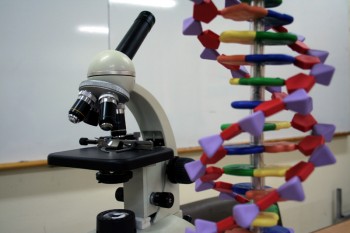 If you own a mutt, as I do, you may have spent some time wondering what breeds went into his making. Thanks to a new test from BioPetVetLab.com, it doesn’t have to cost you an arm and a leg to find out.
If you own a mutt, as I do, you may have spent some time wondering what breeds went into his making. Thanks to a new test from BioPetVetLab.com, it doesn’t have to cost you an arm and a leg to find out.
The technology to distinguish between breeds has been available for a short while, but you had to go to your vet and have blood drawn and sent to a lab to find out. After your wallet was about $160 – $200 lighter, you would get your results back in a couple of weeks.
The new process costs just $60 and you can do the test at home. You simply swab the inside of your dog’s cheek and send it in for analysis. The instructions say they will e-mail you with the breeds as soon as they find out and will then send an official certificate showing your dog’s ancestry.
Kayla wasn’t wild about the swabbing, and you have to do it about 8 times to get enough cheek cells for analysis, but she did allow me to complete it. I think she was a little scared by my being near, ok inside, her mouth. I had to chase her for the last few swabs, but she did let me do them.
Although they don’t have all of the breeds’ DNA profiles yet, the test is supposed to detect over 90% of the breeds in the United States. The only limitation seems to be that the purebreds in the family can’t be too far removed from the mutt. For example, if your dog is the great-grandchild of mutts, chances are the DNA will be too diluted to be able to trace his heritage.
BioPetVetLab doesn’t sell the kits directly; they only do the processing, but their website lists several online and bricks & mortar sources to buy one. I ordered mine from HappyDogDNA on 6/26. I received the kit on 6/28 and sent it back the next day. So, in about a week or so, I should be able to tell you what Kayla is. Can’t wait!
Until next time,
Good day, and good dog!

just by looking at her I would say she is German shepherd and Lab mixed or maby german shepherd and great dane, but she definatly has some shepherd in her
An added bonus to having this test done is that a portion of your money spent on the test goes to cancer and disease research for humans at the Fred Hutchinson Cancer Research Center. The groundwork for this test was done at the FHCRC in Seattle, WA. The “Hutch” as we call it around here owns, the rights to this patented procedure. The companies who are selling this kit and doing the DNA sequencing purchased license agreements from the FHCRC. Which means they pay the Hutch money, which is then used for research at the center. Win win for everyone.